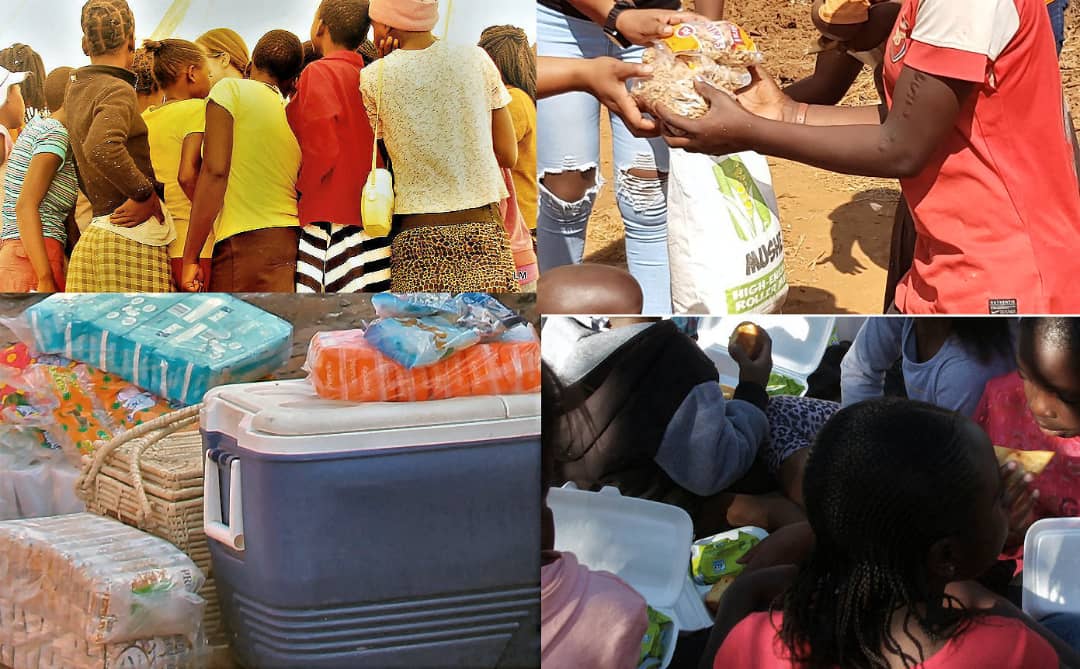|
Getting your Trinity Audio player ready…
|
Writes Clayton Masekesa
PENHALONGA – As the night falls, young girls gather in and outside the packed nightclub blurring local sungura music. Some are elaborately done up in make-up, others stand plainly in skin tights and tops.
The young sex workers skimpily dressed stroll around the bars in hunt of potential clients at the Old West shops in anticipation of a big catch.
Despite the abundance of sex workers of all ages, young girls are a popular choice among clients and there is no shortage of demand for their services.
Hard-pressed by an infinite economic trudge, fraught sex workers from all over Zimbabwe have besieged the small township in Mutasa district and have begun a new wave of sweeping sex work in anticipation of the massive sums of money being spent by the artisanal miners known in local parlance as Gwejas.
Memory Dube (15), not her real name, has been selling sex for money since the Penhalonga gold hype.
“I am here to eke out a living because I am from a poor background and I got no one to help me. All l want is cash, nothing else,” she said.
Dube is one of a dozen teenage girls huddled in wooden shacks at a popular section in Tsvingwe known as kumaBoard.
This is where hardcore sex work, usually unprotected, is being done even in broad daylight.
The chilling and terrifying reality is that the sex workers are engaging in unprotected sex, as the major clients (the Gwejas) have disposable cash, but they are reckless health-wise.
“The reality is that most of the Gwejas do not want to use condoms. They want unprotected sex. As a person desperate for money, l end up having it. My mission here is to have as much money as possible because this is the right time to make money despite the consequences,” she said.
Artwell Shiridzinomwa, the Manicaland provincial manager for the National AIDS Council (NAC), said a 2023 report has shown that Tsvingwe clinic, St Augustine Clinic, and Premier Clinic, all in Penhalonga, contributed 30 percent of the total number of cases of STIs recorded in Mutasa
district.
“Using STIs as a proxy indicator to unprotected sex shows that the area has suddenly become a hot spot for HIV transmission,” said Shiridzinomwa.
He said Penhalonga harbours key populations – mainly female sex workers and at-high-risk men, mainly the artisanal gold miners.
“As we enter the last mile in HIV management, these subpopulations need differentiated HIV services tailor-made to suit their unique demands and needs. NAC Manicaland is diligently implementing a sex workers programme covering Penhalonga,” he said.
“Sex Worker Peer Educators conduct interpersonal communication sessions and refer those who need HIV prevention services to local health facilities. The key population sex workers programme aims to increase access to HIV services,” explained Shiridzinomwa.
“For the at-high-risk men who are the artisanal miners, NAC has implemented the male engagement program in Penhalonga and Premier mining areas through the Behaviour Change Community Motivators who target men with HIV prevention messages recruit them in groups of 20 per facilitator and conducting sessions covering topics on HIV, GBV and Sexually Transmitted infections. The groups run for three months and each motivator reaches 80 men with sessions annually and also reaches at least 156 men during home visit sessions. The Penhalonga and Premier areas are being covered by four Behaviour Change Community Motivators,” he said.
Faith Jimu from Family Aids Caring Trust (FACT), a Behavior Change Facilitator, said their major thrust is raising awareness among young sex workers on HIV and AIDS issues and sexual and reproductive health.
“We are moving around these areas to provide them with HIV test kits and condoms. We are also giving them information, education, and communication equipment on these issues,” said Jimu.
“The situation is 50-50. Some of the artisanal miners and sex workers are listening to our education campaigns on HIV and AIDS issues, but others are turning a blind eye,” she said.
“There is a need to do more sensitization campaigns because the sex workers and the artisanal miners come and go, so it is important to help them at intervals. The local authority must shut down the shacks which are being used by the sex workers to do their work,” Jimu explained.
The Penhalonga Residents and Ratepayers Trust chairman, Weston Makoni, expressed grave concern about the influx of sex workers and other vices connected to sex work.
“This is a cause for concern. We have sex workers who have invaded our area, as they are looking for money from the artisanal miners. We have seen that our young girls have joined in the profession and there are reports that there are cases of STIs, which is worrying us,” said Makoni.
Janet Sigauke, a community leader, said there have been some cases of girls dropping out of school.
“What is worrying is that we have realized that some girls have dumped school and have joined sex work. The situation has gone out of hand. They have refused to go back to school, as they have tested the money associated with sex work and they have opted to remain at the mining communities doing that rather than going to school,” said Sigauke.
Centre for Research and Development director, James Mupfumi, said to curb prostitution in Penhalonga, Redwing mining activities must be restored to the rule of law.
“Prostitution thrives in an environment of lawlessness and unaccountability. Government must be reminded that it has a constitutional obligation under section 73 to protect the environmental health of citizens,” said Mupfumi.
“The suspension of the rule of law by the government to protect corrupt mining syndicates that have captured the mine is regrettable and unforgiven,” he said.
